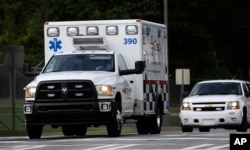The World Health Organization is rolling out a new two-step strategy to try to prevent transmission of the Ebola virus in West Africa on the same day it announced the death toll from the worst Ebola outbreak in history had risen to at least 2,296.
The WHO said although all five Ebola-affected countries in West Africa are suffering from the same virus, the manner and speed with which the deadly disease is being transmitted varies.
Therefore, the WHO argued that different strategies are needed to combat Ebola in countries of low transmission compared to those of high transmission.
The group said its focus will be to end chains of transmission in Nigeria and Senegal, countries with relatively few Ebola cases.
But the strategy will be more complex in Liberia, Sierra Leone and Guinea.
Critical step
Most of the hot spots in these high-transmission countries are in forest areas, where the outbreak started. From there the virus has spread rapidly to other parts of the country.
To prevent transmission of the disease, the WHO said it is critical to hospitalize and isolate people infected with the virus as quickly as possible, so they do not infect others.
But in places like Liberia's capital, Monrovia, the disease is out of control. There are far too few hospital beds for patients and far too few health care workers to help them, the WHO said.
WHO Pandemic and Epidemic Diseases Director Sylvie Briand explained the new strategy will be on training communities to safely take care of those who fall ill.
She told VOA it is important to relate with people in a compassionate manner in Ebola-affected communities so they will be more inclined to do what needs to be done.
“Everybody prefers to be hospitalized close to their home and still have contact with their family and their friends rather than being really isolated very far away from where they live," Briand said. "So ... we plan to offer to these people a place where it is safe, where they can receive basic care, rehydration, anti-malarial and supportive care.”
Briand said this will not be easy to do, but drastic measures are needed.
Health care worker shortage
The WHO estimates 12,000 trained and protected health care workers and 750 infectious disease specialists are needed to stem the Ebola outbreak. The actual number available is far off that mark.
For every 100,000 people, Liberia has one doctor; Guinea and Sierra Leone have two, the health organization said.
But Briand said several doctors have died from Ebola, meaning several hundreds of thousands of people have no access to a doctor.
“What we are trying to do is really make sure that, at least in the health care Ebola treatment centers, we have at least a supervision of sufficiently trained doctors so that they can take care of patient, but also not get contaminated," she said.
The WHO warned the Ebola virus may infect up to 20,000 people in the next six to nine months. More than than 2,200 people have already died, nearly half of them in Liberia.
Fourth US patient
Meanwhile, in the United States, a fourth Ebola patient from West Africa arrived in Atlanta on Tuesday for treatment. The patient will be the third person treated at Emory University Hospital , where two other people were successfully treated for the disease.
The patient's identity was not released, and the hospital released no additional details. But the WHO said a doctor who has been working in an Ebola treatment center in Sierra Leone has tested positive for the disease.
An air ambulance carrying the new patient landed Tuesday morning at Dobbins Air Reserve Base, footage from Atlanta television station WSB-TV showed. The patient had been reported in stable condition on Monday in Freetown.
Last month, Christian missionary health care workers Kent Brantly and Nancy Writebol were released from Emory after being treated for the Ebola virus.
Another American, Dr. Rick Sacra, 51, is being treated for Ebola at the University of Nebraska Medical Center in Omaha, Nebraska, located in the Midwest.
In Omaha, Sacra's family members said on Tuesday that Sacra was able to eat breakfast Monday for the first time since arriving Friday at the Nebraska hospital.
Experimental drug
Sacra is being treated with an experimental drug that is different than Zmapp, the one given to Brantly and Writebol. Sacra's doctors have refused to name the drug they are using, but they say they've been consulting with experts on Ebola on his treatment.
Sacra went to Omaha instead of Emory in Atlanta because federal officials asked the medical center to treat him in order to prepare other isolation units to take more Ebola patients if needed.
The Ebola outbreak in West Africa has killed more than 2,200 people out of more than 4,200 cases in five West Africa nations: Liberia, Guinea, Sierra Leone, Nigeria and Senegal, the WHO reported.
U.S. aid
Also on Tuesday, the United States said it would contribute $10 million to pay for medical workers and equipment to fight the deadly Ebola epidemic ravaging West Africa, officials in Washington said.
The latest cash infusion would bring to more than $100 million the funds that the U.S. government has spent trying to combat the outbreak, the U.S. Agency for International Development said.
USAID said the funds would help finance a deployment by the African Union (AU) of doctors, nurses and other medical personnel to Liberia, Guinea, Sierra Leone and Nigeria.
Also, the United States and Britain pledged on Monday to send military personnel to the region to help set up new treatment centers.
The Pentagon said its personnel would set up a 25-bed field hospital in Liberia's capital, Monrovia, for infected health care workers.
Britain's military said it would open a 62-bed treatment facility in Sierra Leone, near the capital, Freetown.
Some information for this report provided by Reuters, AP and AFP.






